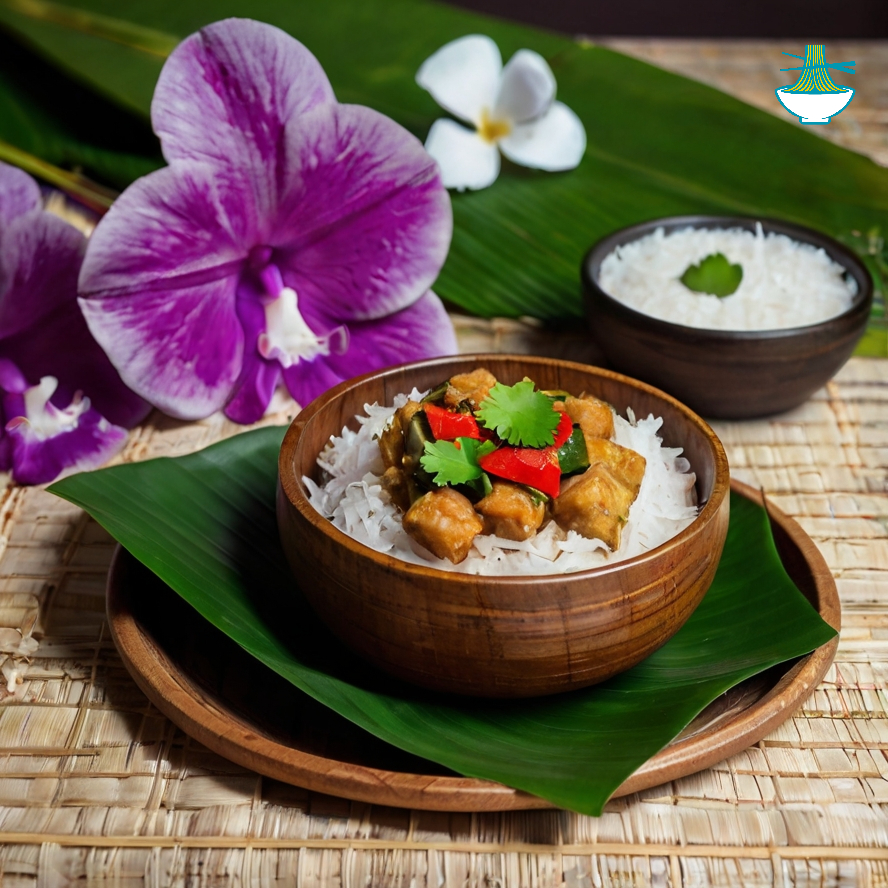Discover the flavors of tradition with our Chaleko recipe, a delightful blend of coconut and taro leaves. Learn how to prepare this classic dish and bring a taste of the tropics to your table.
Here's a recipe for Chaleko, a traditional coconut and taro leaf dish:
Ingredients:
- 2 cups taro leaves, washed and chopped
- 1 cup grated coconut
- 1 onion, finely chopped
- 2-3 green chilies, chopped
- 1 teaspoon ginger-garlic paste
- 1/2 teaspoon turmeric powder
- Salt, to taste
- 1 tablespoon oil
- 1/2 teaspoon mustard seeds
- 1/2 teaspoon cumin seeds
- 2-3 dry red chilies
- 1/2 cup water
Instructions:
1- Heat oil in a pan and add mustard seeds. When they start to splutter, add cumin seeds and dry red chilies.
2- Add chopped onions and green chilies. Saute until the onions are soft and translucent.
3- Add ginger-garlic paste and saute for another minute.
4- Add turmeric powder and mix well.
5- Add chopped taro leaves and cook for 2-3 minutes.
6- Add grated coconut and salt. Mix everything well.
7- Add water and bring it to a boil. Reduce the heat, cover, and simmer for 15-20 minutes or until the taro leaves are cooked.
8- Serve hot with rice or roti.
Nutritional Values:
Here's the approximate nutritional information for the ingredients used in the Chaleko recipe:
Taro leaves (2 cups, chopped):
- Calories: 40
- Carbohydrates: 8g
- Protein: 4g
- Fat: 0g
- Fiber: 4g
benefits:
- Rich in fiber, which aids digestion and helps prevent constipation.
- Good source of vitamins A and C, which are important for immune function and skin health.
- Contains minerals like potassium and magnesium, which are essential for heart health and muscle function.
Grated coconut (1 cup):
- Calories: 283
- Carbohydrates: 12g
- Protein: 3g
- Fat: 27g
- Fiber: 7g
benefits:
- High in healthy fats, which can help improve cholesterol levels and reduce the risk of heart disease.
- Contains antioxidants, which help protect cells from damage and reduce inflammation.
- Provides medium-chain triglycerides (MCTs), which are easily absorbed and can be used as a quick source of energy.
Onion (1 medium):
- Calories: 44
- Carbohydrates: 10g
- Protein: 1g
- Fat: 0g
- Fiber: 2g
benefits:
- Rich in antioxidants, particularly quercetin, which may have anti-inflammatory and anti-cancer effects.
- Contains prebiotic fibers that feed the beneficial bacteria in your gut, promoting gut health.
- May help lower cholesterol levels and blood pressure.
Green chilies (2-3):
- Calories: 6
- Carbohydrates: 1g
- Protein: 0g
- Fat: 0g
- Fiber: 0g
benefits:
- Has anti-inflammatory properties that may help reduce muscle pain and soreness.
- May help reduce nausea and improve digestion.
- Contains antioxidants that help protect against oxidative stress and chronic disease.
Ginger-garlic paste (1 tsp):
- Calories: 10
- Carbohydrates: 2g
- Protein: 0g
- Fat: 0g
- Fiber: 0g
benefits:
- Has antibacterial and antiviral properties, which may help boost the immune system.
- Contains antioxidants that protect against cell damage and aging.
- May help lower cholesterol levels and blood pressure.
Turmeric powder (1/2 tsp):
- Calories: 4
- Carbohydrates: 1g
- Protein: 0g
- Fat: 0g
- Fiber: 0g
benefits:
- Contains curcumin, a compound with powerful anti-inflammatory and antioxidant properties.
- May help alleviate symptoms of arthritis and improve joint function.
- May help improve brain function and reduce the risk of brain diseases like Alzheimer's.
Oil (1 tbsp):
- Calories: 120
- Carbohydrates: 0g
- Protein: 0g
- Fat: 14g
- Fiber: 0g
benefits:
- Healthy fats found in cooking oils, particularly omega-3 and monounsaturated fats, support brain health by maintaining cell membrane structure and function. This can improve cognitive function and reduce the risk of neurodegenerative diseases like Alzheimer's.
- Cooking oil helps the body absorb fat-soluble vitamins (A, D, E, and K) from foods. These vitamins are essential for various bodily functions, including immune support, bone health, and skin protection.
Mustard seeds (1/2 tsp):
- Calories: 6
- Carbohydrates: 0g
- Protein: 0g
- Fat: 0g
- Fiber: 0g
benefits:
- Rich in antioxidants and minerals like selenium and magnesium.
- May help reduce inflammation and lower the risk of chronic diseases.
- Contains compounds that may help improve digestive health.
Cumin seeds (1/2 tsp):
- Calories: 4
- Carbohydrates: 1g
- Protein: 0g
- Fat: 0g
- Fiber: 0g
benefits:
- Contains antioxidants that help fight free radicals and reduce oxidative stress.
- May help improve digestion and reduce symptoms of irritable bowel syndrome (IBS).
- Contains anti-inflammatory properties that may help reduce inflammation in the body.
Dry red chilies (2-3):
- Calories: 18
- Carbohydrates: 4g
- Protein: 1g
- Fat: 0g
- Fiber: 1g
benefits:
- Dry red chilies contain antioxidants such as vitamin C, carotenoids, and flavonoids, which help protect the body from oxidative stress and free radical damage. This reduces the risk of chronic diseases like cancer and heart disease.
- Capsaicin in dry red chilies can help reduce bad cholesterol (LDL) levels while increasing good cholesterol (HDL) levels. This supports heart health and lowers the risk of cardiovascular diseases.
Water (1/2 cup):
- Calories: 0
- Carbohydrates: 0g
- Protein: 0g
- Fat: 0g
- Fiber: 0g
benefits:
- Water helps regulate body temperature through sweating and respiration, keeping the body cool in hot conditions and preventing overheating.
- Water helps regulate body temperature through sweating and respiration, keeping the body cool in hot conditions and preventing overheating.
These values are approximate and can vary based on the specific brands and quantities of ingredients used.


Comments